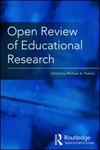Lifelong Learning Policy Agenda in the European Union: A bi-level analysis
Q1 Arts and Humanities
引用次数: 18
Abstract
Abstract The Lisbon European Summit in 2000 has been a milestone in reframing education policies to foster a ‘knowledge economy’, whilst amid the challenges of the new decennium Lifelong Learning (LLL) has been propounded as a powerful lever for attaining ‘sustainable growth’. The present article aims to elucidate the development of an integrated European Union (EU) policy framework for LLL in light of the ‘Lisbon’ and ‘Europe 2020’ Strategies. Through a bi-level analysis of policy texts with high political significance representing a point of reference for a given discourse, it seeks to explore trends and identify interrelations between EU LLL policy and emerging challenges within the Union, as well as global socio-economic mandates that inform contemporary education policy. On the first level, Critical Discourse Analysis was employed, categorizing the data in five main discourse strands. On the second, the data underwent Implicative Statistical Analysis. The results have indicated a substantial shift in the relationship between education and politics, with education assigned a monolithic role in providing for a flexible ‘up-to-date’ workforce, so as to enable the EU to remain a strong global actor.欧盟终身学习政策议程:双层面分析
2000年里斯本欧洲峰会是重新制定教育政策以促进“知识经济”的里程碑,而在新的十年终身学习(LLL)的挑战中,已被提出作为实现“可持续增长”的有力杠杆。本文旨在根据“里斯本”和“欧洲2020”战略,阐明欧盟(EU)综合法律合作政策框架的发展。通过对具有高度政治意义的政策文本的双层面分析,代表了给定话语的参考点,它试图探索趋势,并确定欧盟法律和法律政策与联盟内新出现的挑战之间的相互关系,以及为当代教育政策提供信息的全球社会经济任务。在第一个层面上,我们使用了批判性话语分析,将数据分为五个主要话语链。第二,对数据进行隐含统计分析。研究结果表明,教育与政治之间的关系发生了重大转变,教育在提供灵活的“最新”劳动力方面扮演着单一的角色,从而使欧盟保持强大的全球角色。
本文章由计算机程序翻译,如有差异,请以英文原文为准。
求助全文
约1分钟内获得全文
求助全文
来源期刊

Open Review of Educational Research
EDUCATION & EDUCATIONAL RESEARCH-
CiteScore
2.60
自引率
0.00%
发文量
0
审稿时长
22 weeks
 求助内容:
求助内容: 应助结果提醒方式:
应助结果提醒方式:


